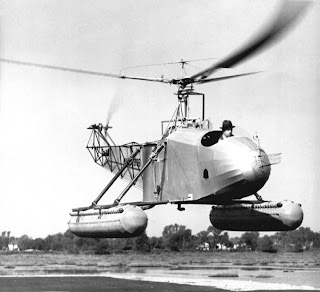

Aviation (multi-engined and helicopter) pioneer.
"Sikorsky, who was virtually unknown in the United States, was working on the S-29A (�A� for America), a twin-engine, closed-cabin, 14-passenger transport. At that time, his �factory� was set up on a chicken farm owned by his friend Victor Utgoff, a former lieutenant in the Russian navy. The obstacles faced by the company seemed insurmountable. Aside from the money problem, the work had to be done by hand, since the farm did not have appropriate machinery. Sikorsky and his workers, mostly Russian immigrants, were raiding junkyards for parts for the airplane, which had to be constantly redesigned depending on the equipment and materials they found. The main structure of the fuselage was built with angle irons from discarded bedsteads. Turnbuckles, which were used to adjust wire tension, were found in a Woolworth�s five-and-dime. The landing gear was installed with the help of Sikorsky�s nephew, Dmitry (Jimmy) Viner, who was a ditch digger. �Since there was no jack to raise the fuselage,� Frank Delear wrote in Igor Sikorsky: His Three Careers in Aviation, �Jimmy dug under it to make space for the wheels and landing struts. With the gear installed, the plane was then pulled out of the ditch.�
Since the work was done outside, cold weather brought it to a standstill. The enthusiasm of Sikorsky�s men, who had worked for weeks without pay, was at its lowest, and the workforce dropped to a mere handful. The few dollars that could be raised by selling stock in the company were spent mostly on food.
One Sunday, a chauffeur-driven limousine drove up to the chicken house. A tall, slender figure in a long black coat stepped out of the car and walked up to the airplane. In total silence, he inspected the aircraft.
Everyone on the farm got greatly excited,� says Sergei Sikorsky, Igor�s son and the retired vice president of Sikorsky Aircraft, who remembers well how his father described the event.. "They all immediately recognized Sergei Rachmaninoff as their guest. My father went up to him and they began to talk. After about a half-hour visit, Rachmaninoff said, �I believe in you and your plane and I want to help you.� � The composer sat down and wrote a check for $5,000 (approximately $100,000 today). With a smile, he gave the check to the stunned Sikorsky and said, �Pay me back whenever you can."� Link…

No comments:
Post a Comment